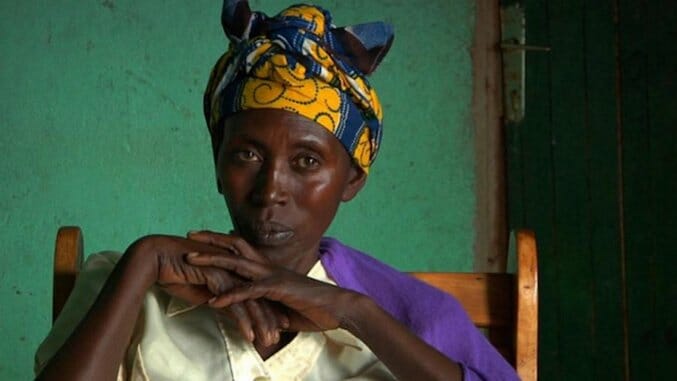
Some 22 years after the Rwandan Genocide of 1994, The Uncondemned mixes firsthand accounts and courtroom footage to revisit a historical moment that would set a precedent in international law. At a time when the realms of public discourse have opened to include discussions of rape, its causes and its consequences, this documentary frames the moment that it would first be prosecuted as a war crime. In doing so, The Uncondemned provides a chance to understand the import of what a small group of young, inexperienced lawyers accomplished: adding rape to the list of crimes that fall under genocide.
It’s estimated that in the span of just a few months in 1994, hundreds of thousands of Tutsi were murdered by the ruling Hutu Power in Rwanda. Later that year, the United Nations sought to prosecute war criminals when it established the International Criminal Tribunal for Rwanda. One of the cases it would hear involved Jean-Paul Akayesu, the bourgmestre (or mayor) of Taba accused of partaking in and making possible the rape and killing of thousands of Tutsi in his township.
Director-writer Michele Mitchell, a journalist by profession, honors those who elevated the profile of rape as a crime and who brought that charge against Akayesu. Through on-camera interviews, we learn that those who helped prosecute the case were young (in their 20s and early 30s), idealistic, inexperienced and driven. Co-prosecutors Pierre Prosper and Sara Darehshori recall the unprecedented nature of their work. Nobody had prosecuted a genocide case in an international trial, and war crimes hadn’t been tried since 1946. Even in presenting their case, they would have to face courtroom conflicts in which their training in U.S. law would run up against a mix of judicial foundations.
Three of their key witnesses—known at the time of trial as Witnesses JJ, NN and OO—form the film’s backbone and reason for being. In sharing their stories with Mitchell, they give a face to a historical moment and recollect the role they played in the case against Akayesu. Through their words, rape is examined as an act that destroys people from the inside. Its use during this military conflict was a means of controlling a population by breaking its spirit through intimidation, the threat of harm and debilitating shame. One of the most enlightening testimonials declares that the rapists succeeded in damaging the souls of their victims, leaving survivors who were alive but shadows of themselves.
As we watch and listen to these women share their experiences, we get a sense of the inner strength they had to call upon to feel comfortable with their own dignity. Mitchell’s choice to forgo narration and let the principals and images carry the story is key to its power. Not all of the footage reinforces or seems to fit with the interviews, but the vistas filmed by co-director Nick Louvel drive home the distance between the beauty of the landscape and the awful way human beings were treated on that land.
The film makes one want a fuller context, for a view that pulls back and shows more of what led to the conflict, the actors involved, and what made the bloodshed possible when the world had already been watching and anticipating the violence. But what The Uncondemned lacks in breadth, it makes up for with a linear storytelling approach to the trial, one that gives related events the power of drama. Mitchell’s film intends to inspire, empower, frustrate and disturb. And by those criteria, it succeeds. In presenting this story at a time when women continue to suffer in high-profile global conflicts, this look at what it means to fight for justice shows the good that is possible even in extraordinary circumstances.
Directors: Michele Mitchell, Nick Louvel
Writer: Michele Mitchell
Starring: Godelieve Mukasarasi, Victoire, Mukambanda, Serafina Mukakinani, Cecil Mukarugwiza, Pierre Prosper, Sara Darehshori, Patricia Sellers, Lisa Pruitt
Release Date: Oct. 21, 2016